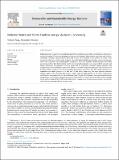Endemic Water and Storm Trash to energy via in-situ processing
Author(s)
Peng, Valerie; Slocum, Alexander
DownloadPublished version (4.809Mb)
Publisher with Creative Commons License
Publisher with Creative Commons License
Creative Commons Attribution
Terms of use
Metadata
Show full item recordAbstract
© 2020 The Authors Significant capital is spent removing and disposing of biomass detritus produced by natural disasters and invasive species infestations. This presents an opportunity to turn the cleanup of these endemic wastes into cost-effective, sustainable bioenergy. Using hurricane debris and invasive water hyacinth as case studies, the results of the presented analysis show that carefully designed, relocatable biofuel facilities that produce energy from biowaste can be cost-competitive and carbon-negative compared to status quo baselines. Techno-economic and carbon accounting analyses show that bioenergy can be economical and sustainable over a range of debris scenarios and facility parameters. Transportation modeling shows that by integrating collection, volume reduction, and transportation, delivered feedstock costs can be reduced by 30–87% compared to status quo costs. For the case of hurricane debris, electricity from biomass boilers and pyrolysis generators with 70% capital utilization are competitive with diesel generators at 4 MW and 1.5 MW scales, respectively. For water hyacinth, anaerobic digestion paired with a harvester that gathers, crushes, and bags plants directly on the water could produce useful heat for a net profit of $9/GJ while offsetting 3 tons CO2e per GJ. Ultimately, the present work shows that careful design and evaluation of bioenergy systems could enable an endemic Water and Storm Trash to Energy Via In situ Processing (WASTE VIP) system that reduces cleanup costs, increases energy security, and converts costly biomass waste into cleaner, cheaper energy.
Date issued
2020Department
Massachusetts Institute of Technology. Department of Mechanical EngineeringJournal
Renewable and Sustainable Energy Reviews
Publisher
Elsevier BV
Citation
Peng, Valerie and Slocum, Alexander. 2020. "Endemic Water and Storm Trash to energy via in-situ processing." Renewable and Sustainable Energy Reviews, 134.
Version: Final published version